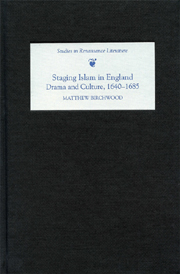Book contents
- Frontmatter
- Contents
- List of illustrations
- Acknowledgements
- Introduction
- 1 Cultural Encounters between England and Islam in the Seventeenth Century: A Topography
- 2 Framing ‘an English Alchoran’: The Famous Tragedie of Charles I and the first English translation of the Qur'an
- 3 Orienting the Monarch: Tyranny and Tragedy in Robert Baron's Mirza and John Denham's The Sophy
- 4 Turning to the Turk: Collaboration and Conversion in William Davenant's The Siege of Rhodes
- 5 Toleration, Trade and English Mahometanism in the Aftermath of Restoration
- 6 Plotting the Succession: Exclusion, Oates and the News from Vienna
- Conclusion: ‘If we our selves, would from our selves exam'ne us’
- Bibliography
- Index
- Studies in Renaissance Literature
- Frontmatter
- Contents
- List of illustrations
- Acknowledgements
- Introduction
- 1 Cultural Encounters between England and Islam in the Seventeenth Century: A Topography
- 2 Framing ‘an English Alchoran’: The Famous Tragedie of Charles I and the first English translation of the Qur'an
- 3 Orienting the Monarch: Tyranny and Tragedy in Robert Baron's Mirza and John Denham's The Sophy
- 4 Turning to the Turk: Collaboration and Conversion in William Davenant's The Siege of Rhodes
- 5 Toleration, Trade and English Mahometanism in the Aftermath of Restoration
- 6 Plotting the Succession: Exclusion, Oates and the News from Vienna
- Conclusion: ‘If we our selves, would from our selves exam'ne us’
- Bibliography
- Index
- Studies in Renaissance Literature
Summary
In a poem composed in 1676 two horses debate the political climate of the day, denouncing the government of Charles II both in terms of a legacy of Stuart tyranny and an anticipated betrayal at the hands of the Catholic James:
[W.] Though the father and son be different rods,
Between the two scourges we find little odds…
One of the two tyrants must still be our case
Under all that shall reign of the false Scottish race.
C. de Witt and Cromwell had each a brave soul:
I freely declare, I am for old noll.
W. Though his government did a tyrant's resemble,
He made England great and its enemies tremble…
C. What is thy opinion of James Duke of York?
W. The same that the frogs had of Jupiter's stork:
With the turk in his head and the Pope in his heart.
Father Patrick's disciple will make England smart.
A Dialogue Between the Two HorsesThe two horses in question were the equestrian statues erected at Charing Cross (the ‘C’ of the poem) and Stocks Market (also known as ‘W’oolchurch), both well-known landmarks of Restoration London depicting Charles I in bronze and Charles II in white marble respectively (see Fig. 1). The anonymous poem, tentatively associated with Marvell by some editors, seizes upon the irresistible opportunity to make a historical comparison between the two monarchs that undercuts the self-confident civic authority apparently proclaimed by the two monuments.
- Type
- Chapter
- Information
- Staging Islam in EnglandDrama and Culture, 1640–1685, pp. 1 - 20Publisher: Boydell & BrewerPrint publication year: 2007



